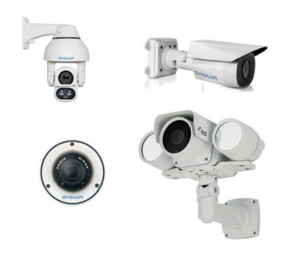Technological advancements can sometimes seem like a gadget-focused arms race — one that’s impossible for business owners to win. Just when they think that they’ve purchased all of the necessary hardware and software to process payments, enable online shopping, and safeguard their brick-and-mortar facilities, some new piece of tech emerges, instituting a brand-new upgrade cycle. The truth of the matter is that many technological “advancements” only offer minimal upgrades to current equipment. However, sometimes a true advancement comes along, one that revolutionizes the field, and owners would do well to upgrade immediately.
Since the advent of 4K security cameras, business owners and managers alike have begun asking, “Is 4K CCTV worth it?” This post will explain some of the technical details about 4K CCTV and 4K security cameras, hopefully providing you with a framework to answer that question.
Is a 4K security camera worth it?
 Before we attempt to say whether or not a 4K security camera is a wise purchase, let’s consider exactly how a 4K camera works, and let’s start with the most fundamental element of a digital image: a pixel.
Before we attempt to say whether or not a 4K security camera is a wise purchase, let’s consider exactly how a 4K camera works, and let’s start with the most fundamental element of a digital image: a pixel.
Short for “picture element,” a pixel is an itty-bitty square that’s displayed on a screen. A screen has millions of these itty bitty squares. When your camera records footage or captures an image, playing it back will tell your screen to shift its pixels in certain ways, thereby creating a video or picture. The more pixels the camera can capture, the more detailed the image. But as we will see in a couple sections, the camera isn’t the only element required for a tack-sharp image.
Up until recently, the most detailed images you could achieve would be displayed in a row of 1,080 pixels running vertically and 1,920 pixels running vertically. This standard became known as (appropriately enough) 1080p. However, the more-or-less newest high-definition standard features images displayed at 2,160 pixels vertically and 4,096 pixels horizontally. That translates into about four times as many total pixels as 1080p resolution, which is why it earned the name 4K.
On paper, 4K sounds like a straight upgrade to 1080p. But as we will soon see, both options have advantages and disadvantages.
Is a 4K camera better than 1080p?
 A 4K camera will certainly excel over a 1080p camera at capturing sharper images under ideal conditions. If that sounds like a highly qualified statement, it’s because it is. A series of tests run by Australian security consulting firm Matryx discovered that:
A 4K camera will certainly excel over a 1080p camera at capturing sharper images under ideal conditions. If that sounds like a highly qualified statement, it’s because it is. A series of tests run by Australian security consulting firm Matryx discovered that:
- A tested 4K camera struggled to “freeze” moving people and vehicles under low-light conditions
- A tested 4K camera showed significant visual bloom when a flashlight was pointed at it, as did a pair of 1080p cameras
- A tested 4K camera produced significantly larger file sizes
Before the winner of 1080p vs 4K cameras has been decided, understand that such findings are simply 4K security camera considerations to take into account rather than definite downsides. Just because one 4K camera performs poorly when tested in darkness doesn’t necessarily mean that all will. Some of the best 4K CCTV cameras come with a high dynamic range, which indicates that it can simultaneously extract data from both highly lit and poorly lit areas of a frame, making them ideal for nighttime surveillance. Similarly, many systems can mitigate larger file sizes by using the H.265 codec, which is a high efficiency video coding (HEVC) protocol.
The lesson to take away from this is that we shouldn’t ask if 4K is better than 1080p equipment or vice versa. Rather, selecting your camera equipment is more of a question of value. If you need to read license plates on footage captured during the middle of the day or want to positively identify peoples’ faces even at a distance, 4K will likely benefit you more. If price and storage are concerns or you primarily need your system to function reliably at night, 1080p might fit your needs.
Do you need a 4K monitor for 4K security cameras?
If you’re wondering whether or not you need a 4K monitor to pair with a 4K camera system, the answer is yes — and no. In order to display in all its detail, 4K footages needs to be displayed on a monitor that shares that same number of pixels in which it was recorded. However, that doesn’t mean that you’re solely locked into using a 4K monitor. You can review 4K footage on any display as long as you’re able to accept the concomitant loss in detail.
Can you tell the difference between 1080p and 4K?
Some people maintain that they simply can’t tell the different between 1080p and 4K resolutions with the naked eye, and while this may seem a subjective complaint, there’s some truth to it. The difference between the two resolutions shows primarily in small details. The logo on a piece of clothing. The lines on a face. Fine writing on a bumper sticker or license plate. These details may seem incidental, but they can also provide important information should a criminal incident occur.
Does my 1080p CCTV look better than my 4K?
In some instances, a 1080p CCTV system may indeed look better than a 4K system. We’ve already mentioned dynamic ranges, low-light conditions, incidents involving fast movement, and the like. Still, 4K systems should excel at offering extremely detailed footage in most situations, which is exactly why you would select such a system.
If you’re unsure what kind of CCTV system would work best for your particular property, contact us at AT&I Systems. We have helped organizations of all stripes throughout South Florida for decades. Some of the sites we’ve helped secure include educational establishments, manufacturing facilities, multi-family housing complexes, financial institutions, governmental bodies, and hospitals. In the end, your gain is our goal.


















